- Home
- Dan Millman
The Hidden School Page 2
The Hidden School Read online
Page 2
A merchant in Baghdad sent his servant to the market. The servant returned, trembling in fear. “Master, I was jostled in the market. I turned around and saw Death. He made a threatening gesture toward me, and I fled. I beg your leave and a horse, so that I may ride to a place I know in Samarra, where I can hide.”
The master lent him a horse, and the servant fled.
Later the merchant saw Death in the crowd and asked, “Why did you threaten my servant?”
Death replied: “I didn’t threaten your servant. I was only surprised to see him here in Baghdad, for I have an appointment with him tonight in the town of Samarra.”
This story about the inevitability of death was understandable given Nada’s age and apparent foreknowledge of her imminent demise. But why would she want to share it with me in her final moments? The answer came as I read the two final lines at the bottom of the page:
Dear one: Only death’s counsel can bring you back to life. The empty pages are for you to fill with your own heart’s wisd . . .
The unfinished word marked her last breath. Now I truly understood her words “You’ll know what to do.” As her last request and final instruction, she’d bestowed on me both a blessing and a burden.
When I closed her journal and picked it up, it felt as if I were holding her in my arms, as if her soul had flown from her body into the book.
TWO
* * *
Surely Socrates didn’t intend for me to go and find a nearly empty book in the desert! I already have a blank book, I thought, glancing at the journal that had torn the lining of my knapsack, leading to the discovery of his letter. My journal also had a clasp and key like the one he had described, and already looked as frayed as I felt at that moment. I took a deep breath before submerging again into his story:
My “own heart’s wisdom,” she had written. What did my heart understand? What had I learned that might be worth sharing? In asking me to fill the empty pages of this slim volume, Nada had given me a purpose beyond everyday living, but one that I had little hope of accomplishing. Could I write any words of significance? The idea filled me with doubt.
Sitting in that cactus garden with her journal on my lap, I couldn’t even think about writing in it. Instead, the notion came to me that it was time for a change. I decided I would travel across the country, passing through the deserts of the Southwest, to live out the rest of my life on the West Coast of the United States. After I settled in California or perhaps in Oregon, I would think about putting pen to paper.
Over the next few days, I packed up my apartment, visited the bookstore, and wandered through the city one last time. But the landmarks that absorbed me were internal ones. Pages of memory turning one by one.
Which led me to think of you, Dan, and the challenges and doubts you too must have faced in trying to integrate and embody what I’ve revealed to you. I still wonder how much one person can do to help improve or illuminate the life of another. I know firsthand that mere knowledge doesn’t take away the difficulties of life. But a deeper understanding and expanded perspective may help us face adversity with greater resilience and spirit. The task I now place before you—finding the journal that I lost—will test how well our time together has served you.
This letter was unmistakably Soc’s. He wrote it most likely only a few years past. So clearly he was still alive at that point and had retained his sharp mind. I felt as though I were meeting his younger self for the first time. What moved him to share his inner life so freely? I wondered. Maybe the old guy misses me as much as I miss him.
With that thought, I turned back to his letter:
To help you understand what the journal has to offer, and how I lost it, let me return to my story: A few days after leaving New York City, I reached Denver. From there, a few rides took me south toward the Sangre de Cristo Mountains and through Santa Fe, New Mexico. I stopped there for a few days before catching a ride into Albuquerque, where I planned to head west along Route 66.
An hour or so west of Albuquerque, my ride dropped me off near an Indian pueblo and pointed toward what he said was a school down the road.
When the truck’s dust cloud cleared, I could make out a few scattered bumps on the horizon, which could have been a ghost town or a mirage. I walked in the direction the trucker had indicated, intending to fill my canteen before returning to the highway.
A few minutes later, after passing a large granite boulder and some small cacti adorned with magenta flowers—it’s strange what images come to mind—I came to a one-room adobe schoolhouse. Children played in a dusty yard bordered by a well-tended garden.
As I used a hand pump to fill my canteen, a little girl approached me and introduced herself. She made quite a first impression, boldly announcing that she would one day teach at the school. I mention this girl because she may be important, because I would see her again. Her name may have been Emma.
I returned to the highway and caught another ride through a day and a night and into the next evening. In the quiet of the desert country, somewhere in the Mojave Desert of Arizona, or it could have been after I’d headed north into Nevada, I thought of Nada and her ashes in that cactus garden. I decided to camp for the night about fifty yards off the road.
Sometime in the night I awoke in the grip of an alternate reality, as if I’d ingested peyote or some other psychotropic plant. A flood of inspired ideas filled me, so I seized the journal and began writing by moonlight.
At the same time, my body temperature rose and a feverish state took hold, pushing aside my conscious mind so the fruits of a deeper mind poured out onto the pages. I couldn’t keep up with the flood of ideas. I can’t recall whether the sentences were fully formed or even made sense. As the fever overwhelmed me, I continued to write, no longer aware of the words themselves or of my surroundings. My head throbbed. I felt dizzy and confused. The desert had entered me, bringing burning heat, then chills. Samarra, I thought. This is Samarra.
I have only dreamlike impressions of what happened next: I recall wandering along the highway . . . writing . . . sleeping in a riverbed . . . writing . . . stumbling and falling . . . more writing . . . night and day. . . . One day passed, maybe two or three, flipping past like the pages of a book, of her journal. I remember climbing out of a truck, clinging to the pack that held the journal. I may have spoken to one stranger, maybe others. About the journal and what I’d written—about eternal life.
At some point, perhaps fearing that someone might take it from me or that I might drop it in the desert, I must have found a safe place to deposit the journal, with the intention of coming back to retrieve it. I may have climbed a hill. Impressions of darkness and light. A tunnel. A high place. Beyond that, nothing.
The fever waxed and waned. Sometimes a darkness overshadowed me. Other times I experienced moments of clarity, rays of light. Once I came back to myself as I stumbled along a road in the desert. Yes, I think it was the Mojave. Arizona or Nevada, maybe near the border. I can’t be sure. Someone picked me up, and then someone else. I must have stumbled to the other side of the highway, where I was taken south and then eastward, back toward Albuquerque.
I was so lost in my fever that I could only remember where I’d come from, not where I was going. I caught myself muttering aloud more than once, speaking with insects and animals amidst glowing landscapes, real or imagined. In this waking dream a local man appeared. Hispanic, I think. He poured water on my head.
Later I felt a cool cloth on my forehead, saw a white ceiling. I was in a clean bed. A young doctor told me that I had nearly died and that I was in a clinic or infirmary west of Albuquerque. Maybe near that school where I’d stopped for water.
I remained weak for some time, drifting in and out of consciousness. My dusty rucksack sat on a chair nearby with my personal items. I didn’t realize until later that the journal was gone. I had a vague feeling that I’d hidden it, but no recollection at all of a location.
After I left the hospital, I thought about
trying to find it so I could read what I’d written. As I headed west once again, I gazed out car and truck windows at the passing desert, struggling to recall where I might have hidden the book, searching for any familiar landmark, waiting for a cue or impulse to turn around, to go back.
Even after I settled in Berkeley, California, I waited patiently for a memory or impression to surface. But I couldn’t re-create the time or place. Maybe I wasn’t meant to. This letter is the most I’ve written about it since those days in the desert. Even as I write, images appear: a dark place, a tunnel, the sun-darkened skin of a local man, white curtains, a child’s voice.
I know I haven’t given you much to go on, Dan. But remember this: Wherever you step, a path will appear.
“A path will appear?” I sputtered. “Come on, Socrates, there’s got to be something more!” But if there had been more, he would have remembered it, shared it.
I thought back on the time we’d spent together. In the rare moments when Socrates had seemed distracted, had he been thinking about the journal or the words he couldn’t remember writing?
So where does all this leave me? I wondered, flashing back to a moment in my own life, just before my motorcycle smashed into the fender of a Cadillac that had turned in front of me, shattering my leg as it sent me somersaulting to the concrete. I could still recall the thought: This isn’t happening. I had that same feeling now. None of it made any sense. Socrates had no idea where the book was hidden. Yet he wanted me to find it. I turned to the end of his letter.
What I wrote in that journal may serve you well. Or the words may only reveal the ramblings of a feverish imagination. The journey is its own reward, Dan. But you may find this treasure worth the hunt. Let your inner light show the way.
Good journeys,
Socrates
As I folded his letter and slipped it back into the envelope, I thought of the last time I’d seen him in the flesh. He was sitting up in a hospital bed in Berkeley, looking well enough, if slightly pale, after a brush with death. He must have written the letter sometime in the weeks or months that followed, and sent it to Mama Chia for safekeeping.
I gazed outside as the Hawaiian sun broke through and turned leaves into emeralds, but my attention was darkly shrouded by questions: Why has Socrates given me this task? Is it an initiation or test—his way of passing the torch? Or is he just too old to find it himself? When we first met, he’d claimed to be ninety-six years old, and eight years had passed since then. Yet I could feel his presence and picture him wiping grease-stained hands on a rag or chopping vegetables for a soup or salad he would prepare for us late at night in that old service station office.
His letter pointed to Albuquerque and a nearby school and infirmary. But the Mojave Desert stretched across parts of Southern California, Arizona, and Nevada. “Only thousands of square miles to search,” I muttered sarcastically, as if he were sitting across from me. “I can just fly into Albuquerque, retrace your steps by driving west to the Mojave, and then start digging.”
Or, I thought, I can stick with my plan and fly to Japan. I had my ticket. I was nearly halfway there, and about three thousand miles away from the deserts of the Southwest, which lay in the opposite direction.
I knew I couldn’t visit every small hospital in New Mexico trying to access decades-old private records. What Soc’s asking of me isn’t just difficult. I’ve done difficult before. It’s impossible! I found myself pacing around my hotel room, conversing again with the air: “Sorry, Soc, not this time! I’m not going to spend months playing Don Quixote of the Dunes, looking under every rock in the Southwest. I can’t do it. I won’t!”
Yet I couldn’t dismiss what he’d written—that without the journal I’d arrive in Japan empty-handed, “a seeker, begging alms of insight.” And I’d never refused Soc before. Just then I recalled a favorite trilogy, The Lord of the Rings, where little Frodo prevails against all odds and reason. But that story is fiction, I reminded myself. This is real life!
Socrates had once told me, “When opportunity knocks, have your bags packed.” My bags were packed—for Japan! Everything was arranged. What if I hadn’t found his letter? What if it had stayed hidden in the lining of my backpack? Well, I had found the letter. With a deep sigh I slipped it into my empty journal, which I stuffed back into my knapsack.
Back and forth it went: I wanted to go to Japan. I didn’t want to go hunt for a mysterious book in the desert. As Socrates once said, “It’s better to do what you need to do than to not do it and have a good reason.” Did I need to find this journal?
I decided to sleep on it. But before I slept, I reminded myself again to mail the postcard to my daughter when I arrived at Honolulu Airport—a place for departures, a place for decisions.
THREE
* * *
The whirling dervish of my mind must have settled its affairs during the night. The instant I awoke I knew that I must make the effort—I owed it to my old mentor, and maybe to myself. So, for better or worse, his letter would change my plans and maybe the course of my life. My open travel voucher allowed me to cancel my Japan trip and secure a flight to Albuquerque.
On my arrival, I rented an old Ford pickup from an off-brand agency with easy terms—a cash deposit, no roadside service, and good riddance. Then I found a surplus store, where I traded my worn-out sneakers for a pair of hiking boots. I also acquired a large duffel bag, a canteen, a broad-brimmed hat, a compass, a folding knife, a flashlight, and a light sleeping sack, plus a small folding pick and shovel, sunscreen, and a book about desert survival, which did little to enhance my confidence. After stuffing my purchases into the duffel, I tossed it into the front passenger seat. In the lingering heat of early evening, I found refuge in a nearby motel.
So it came to pass that in my twenty-eighth year, in early September of 1974, on a blistering day in Greater Albuquerque, I walked the streets of Old Town, seeking out locals who might recall nearby clinics or infirmaries from thirty years ago. After reviewing Soc’s letter about the young girl he’d seen, I visited a few natural food markets and alternative bookstores to ask if the proprietors knew anyone named Emma, who’d be in her midthirties now and who might be a schoolteacher. I hoped that someone once drawn to Socrates might gravitate toward such places. I also asked if anyone could recall a man named Socrates who might have passed through town decades ago. I had little else to go on.
None of the clerks knew a local teacher named Emma or had heard of anyone named Socrates (other than the ancient Greek). Dead ends and empty pages, one after another. I spoke to this ethereal Emma in my mind, calling out to her through time and space, reaching into that place where we’re all connected: Where are you?
Later that afternoon, in a small record store, a fashionably dressed older woman overheard me and said, “Excuse me, but are you sure her name is Emma? I once met someone named Ama who taught elementary school outside of town.”
I found a small school on the west side of town with a sign taped to the door: CLOSED FOR SUMMER. When I knocked, a receptionist appeared. She told me, “A woman named Ama taught here for one term, but she moved on. I think maybe she got a job teaching at one of those pueblo schools to the west, off Route 66.”
When I thanked her and turned to go, she was already picking up the telephone on her desk. Busy lady, I thought.
I must have taken a wrong turn, because instead of finding a school I arrived at an adobe hut I’d passed once before. As I neared the entrance, I saw a hand-painted sign: SOUVENIRS. Indian blankets hung under a makeshift eave providing shade, beneath which rested various kinds of pottery and desert artifacts. In one bin I saw pieces of amber, each with a scorpion or another unfortunate creature frozen inside. I shivered as I glanced at the other specimens—a tarantula, a wolf spider, and the reclusive and deadly fiddleback spider. Each insect or reptile had a label: BARK SCORPION, WHIP SCORPION, CENTIPEDE. On a shelf nearby, a stuffed Gila monster kept vigil. In another case I saw a well-preserved diamondback rattlesnake
, a sidewinder, and the Mojave green, a particularly venomous snake—all denizens of the desert that made me wonder again what I was doing here.
I jumped as a voice behind me said, “Buenos días. What can I do for you?” It was Soc’s voice I heard, but when I turned, I saw quite a different old man, with the bronzed skin of Indian or Mexican ancestry. He sat amidst his treasures, gazing out into the dusty air and stringing beads onto threads that edged a colorful blanket. He looked as dry as the desert, reminding me of the ancient nun Socrates had described in his letter.
“Uh, yes . . . well, I’m looking for a woman named Ama. I believe she’s a teacher.”
The old man gave no sign that he’d understood. He only picked up another bead with slow, graceful fingers.
Struggling to recall my high school Spanish, I asked haltingly: “¿Señor, sabe usted . . . ah, dónde está . . . una escuela pequeña . . . y una señora, uh . . . con nombre Ama?”
His eyes brightened and he sat up straight. “Ah, la señora Ama. Sí, una mujer muy fuerte, muy guapa.”
Of course he knows her, I thought, shaking my head at this strange coincidence. A ray of hope. “¿Dónde está . . . ?” My tongue tripped over the words.
“Mi hermano,” he interrupted, “since you swim in Spanish like my uncle Brigante, who drowned in a river many years ago, it might be best if we speak in English.”
“Uh, yes.” I grinned back at him. “That would be easier.” Reaching out to shake his hand, I introduced myself.
Making no move to take my hand, he said, “At first I took you for Greek.”
“Why do you say that?”
“When you spoke, a Greek name came to mind.”
“What name?”

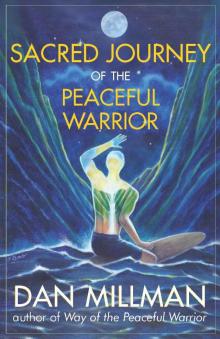 SACRED JOURNEY OF THE PEACEFUL WARRIOR
SACRED JOURNEY OF THE PEACEFUL WARRIOR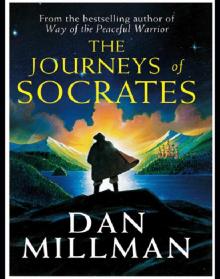 The Journeys of Socrates: An Adventure
The Journeys of Socrates: An Adventure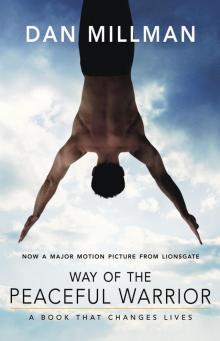 WAY OF THE PEACEFUL WARRIOR: A Book That Changes Lives
WAY OF THE PEACEFUL WARRIOR: A Book That Changes Lives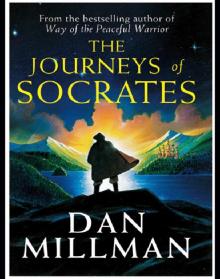 The Journeys of Socrates
The Journeys of Socrates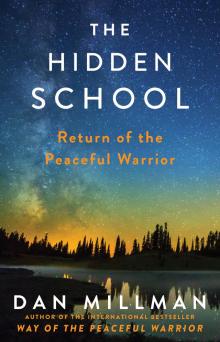 The Hidden School
The Hidden School